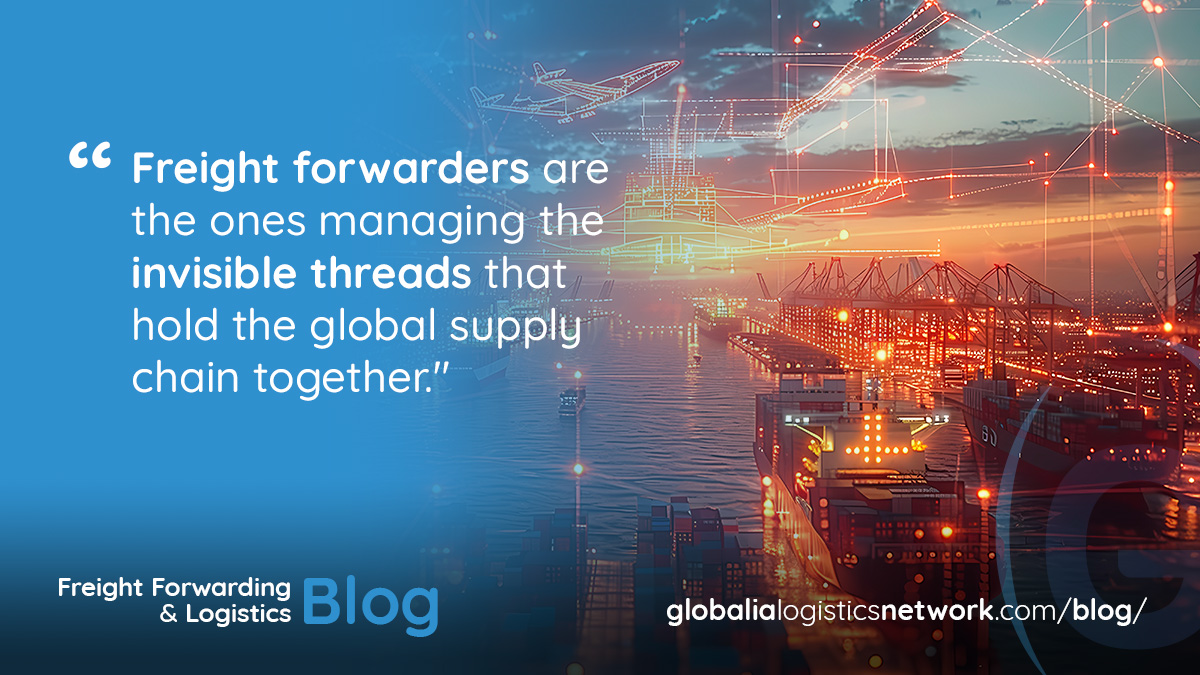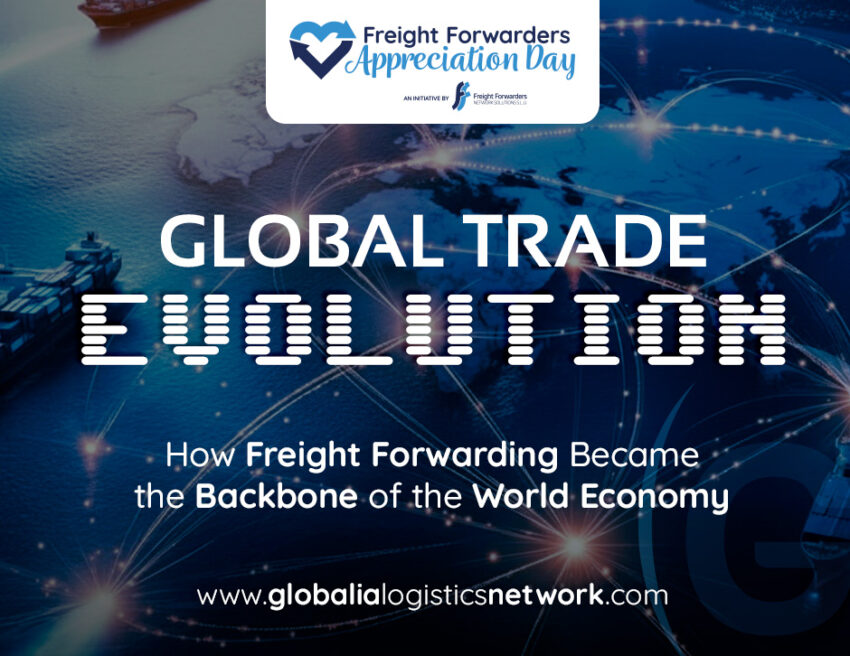Here’s something we don’t say enough: the freight forwarding industry keeps the world running. Quite literally. While the rest of us complain about delayed parcels or missing Amazon deliveries, freight forwarders are the ones managing the invisible threads that hold the global supply chain together. And since Globalia Logistics Network is celebrating Freight Forwarders Appreciation Day on 14th November, it feels like the perfect moment to pause, smile, and acknowledge the people who quietly make international trade possible.
We’re publishing a series of blogs this month to honour these professionals who turn chaos into coordination, paperwork into performance, and shipments into success stories. Let’s take a look at how freight forwarding evolved from dusty trade routes to digital dashboards and how it has become the backbone of our modern global supply chain.

The Early Days: From Sailboats to Steamships
The history of freight forwarding is as old as trade itself. Picture 13th-century Europe, when merchants relied on agents to move goods through unpredictable routes, dodging pirates, taxes, and the occasional storm. These early “forwarders” arranged space on ships, handled customs, and took responsibility for goods long before logistics became a word people used in meetings. Then came the Industrial Revolution, steam engines, and telegraphs, the 19th-century version of digital transformation. Suddenly, the speed of transport exploded, and so did the need for people who could handle the growing complexity of moving goods across oceans and borders. That’s when the modern freight forwarder was truly born, part strategist, part problem-solver, part magician.
The Freight Forwarding Industry: Turning Movement into Mastery
Fast-forward to the 21st century, and the freight forwarding industry has become the nerve centre of world economy logistics. Whether it’s car parts from Germany, electronics from South Korea, or coffee beans from Brazil, freight forwarders make sure these products arrive where they’re needed. What makes their role so crucial is that they don’t just move goods; they manage trust. They handle international shipping documents, negotiate with carriers, optimize routes, and keep costs under control while making sure customs clearance doesn’t turn into a bureaucratic nightmare.
The role of freight forwarders in global trade has expanded from simple cargo coordination to full-blown supply chain orchestration. Today’s forwarders use technology, data analytics, and digital platforms to predict disruptions, improve visibility, and cut carbon footprints. something the medieval merchant could never have imagined while shouting orders on a foggy dock.
The Global Trade Evolution: From Local Deals to Worldwide Networks
To understand how freight forwarding supports the global economy, you need to look at the evolution of trade itself. A few decades ago, commerce was largely regional. But globalization changed everything. Manufacturers spread across continents, consumer demand diversified, and cross-border trade exploded. Suddenly, international trade logistics had to evolve. Shipping routes became busier, regulations more complex, and customer expectations nearly impossible. And through it all, freight forwarders adapted. They became translators between countries, cultures, and compliance laws. The evolution of global supply chains created both challenges and opportunities. Freight forwarders embraced digitization, sustainability, and data-driven operations. They learned to predict port congestion, track emissions, and provide real-time visibility while dealing with late-night calls from clients panicking about delayed shipments.
Freight Forwarding Industry and the Digital Revolution
Technology didn’t replace freight forwarders; it made them even more essential. Platforms now automate customs declarations, AI predicts shipment delays, and digital twins model the impact of disruptions. But behind every smart system is a smarter forwarder who knows that software can’t replace intuition. After all, when a shipment gets stuck at customs due to a typo in the paperwork, it’s not an algorithm that picks up the phone, it’s a human who knows which string to pull and which officer to call.
This blend of human expertise and digital innovation is what keeps the global trade evolution moving. It’s also why freight forwarding is the backbone of commerce because no matter how advanced technology gets, global trade still depends on coordination, communication, and good old-fashioned problem-solving.
How Freight Forwarding Powers the World Economy
Let’s talk numbers for a second. Around 90% of world trade moves by sea, and almost every shipment has a freight forwarder behind it. These professionals don’t just connect businesses — they connect economies. Their work directly influences GDP growth, export competitiveness, and consumer prices. Without them, world economy logistics would be in disarray. Factories would run out of components, retailers would face empty shelves, and global trade would come to a standstill. In short, if freight forwarders ever took a collective day off, the global economy would feel it before lunchtime. The impact of freight forwarding on world trade growth is enormous. It’s what allows small manufacturers in Vietnam to sell in Europe, or startups in Canada to reach customers in Africa.
Why Freight Forwarding is the Backbone of Commerce
Here’s the thing: you can’t have global trade without freight forwarders. They’re the translators, troubleshooters, and timekeepers of international commerce. They manage risks, predict trends, and handle crises with the calm of someone who has already survived a dozen port strikes and a handful of customs delays this year alone. The importance of logistics in international trade is about resilience. Freight forwarders keep goods moving even when the world throws curveballs like pandemics, wars, or canal blockages. That’s why freight forwarding is the backbone of commerce, because it’s indispensable.
A Toast to the Unsung Heroes of Global Trade
As Globalia’s Freight Forwarders Appreciation Day approaches on 14th November, it’s time to raise a glass (or maybe a coffee mug at the office) to the professionals who keep the world connected. They’re the ones answering calls at 3 a.m., finding new routes when ports close, and somehow managing to keep both clients and carriers happy. Their job might not make headlines, but without them, the headlines would be about supply shortages and missed deadlines. At Globalia Logistics Network, this day isn’t just about celebration, it’s about recognition. It’s a way of saying: “We see the work you do. We know it’s not easy. And we’re grateful.”
Looking Ahead: The Future of Global Trade Logistics
The next chapter of global trade evolution will be written by freight forwarders who adapt faster, think smarter, and collaborate better. Green logistics, AI-driven optimization, and stronger international networks will define the coming decades. And as new technologies reshape international trade logistics, one thing will stay the same, the human skill, judgment, and persistence that make freight forwarding not just a profession, but a cornerstone of global progress. So, to every freight forwarder reading this: thank you for keeping the world moving. You are, quite literally, the reason trade never sleeps.


